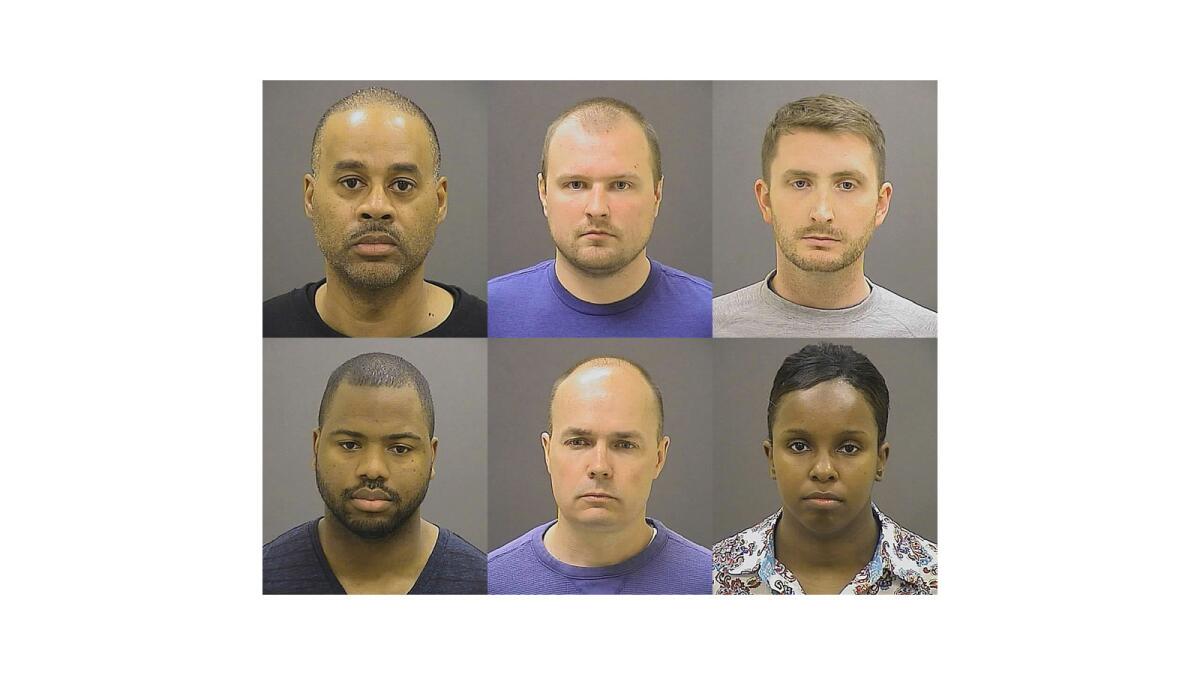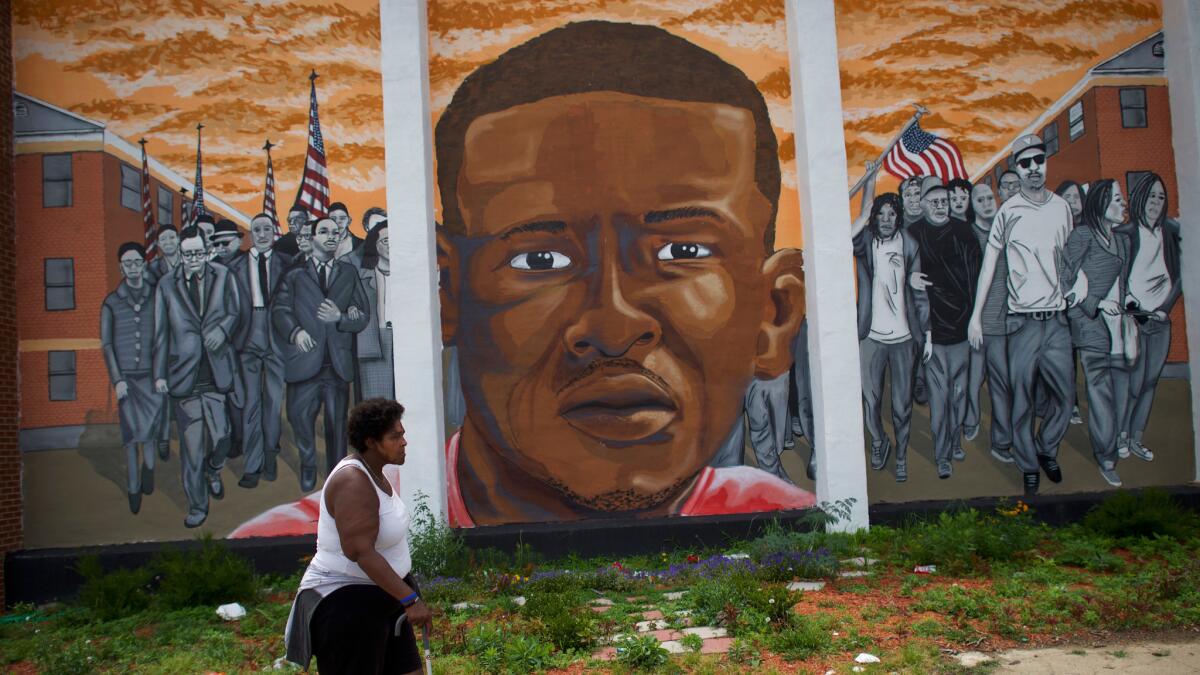For Baltimore officers cleared in Freddie Gray’s death, an uncertain future

- Share via
Reporting from baltimore — After a Baltimore jury convicted him of shooting a man during a 1996 traffic stop, Sgt. Stephen R. Pagotto said he became a pariah in the community and with top police brass.
The Baltimore Police Department fired him, and he became a car salesman in Harford County, where he moved from his Baltimore home after vandals tagged his van with “killer cop.” When Maryland’s highest court reversed his conviction in 2000, he wanted to get back to policing but said command staff made it clear he’d never get ahead. He returned to work one day and retired the next.
Two decades later, Pagotto has been following the case of the six officers charged in the arrest and death of Freddie Gray. Now that all charges have been dropped, those officers are on administrative duties and may return to patrol after internal reviews determine whether they broke department policies.
“I wouldn’t trust anyone if I were them,” Pagotto said.

After being exonerated in other high-profile police prosecutions, some officers have returned to duty with an unbowed sense of duty. In Baltimore, police union leaders and others believe the officers in the Gray case should be welcomed back to the force, given the lack of evidence of wrongdoing. Like anyone else, they are considered innocent unless proven otherwise.
Highlighting support across the ranks for the six and expressing a growing concern that police will be wrongfully prosecuted going forward, union members unanimously agreed to pay more in dues to cover the cost of defending officers in court.
Gray, 25, died a week after he emerged from a police van. Prosecutors accused the officers of causing his death by failing to secure him in a seat belt and get him timely medical care; they also accused Officer Caesar Goodson Jr., the driver of the van, of giving Gray a “rough ride.”
See the most-read stories this hour »
All of the officers pleaded not guilty. Goodson, Officer Edward Nero and Lt. Brian Rice were acquitted before Baltimore State’s Atty. Marilyn J. Mosby dropped the charges against Sgt. Alicia White, Officer Garrett Miller and Officer William Porter last week.
But some officers cleared of crimes in the past have confronted more obstacles: continuing protests, threats, stress-related health problems, political pressure to resign. In Baltimore, Gray’s death continues to elicit strong emotions on city streets, where rioting broke out last year on the day of his funeral.
All officers are changed by such an experience, said Dean Angelo Sr., president of a police union in Chicago, a city still reeling from video showing police shooting an unarmed teenager 16 times two years ago.
“Can they get back to normal? I guess. But it will never be the same for them,” Angelo said of the six Baltimore officers. “It will always be hanging over them. People will always be whispering behind them when they come in and out of a room. They’re going to have to deal with it the rest of their lives.”
The Baltimore officers return to a changed environment. Since Mosby indicted them 15 months ago, tensions between police and residents here and nationally have rarely been worse.
Though protests in Baltimore have remained peaceful since last year’s unrest and police are working to improve community relations, more black men have died after encounters with police across the country, including some caught on camera. Several officers in Dallas and Baton Rouge, La., were killed in retaliatory shootings.
The Baltimore Police Department has also changed. A number of reforms have been implemented — some in response to the Gray case — and more are expected soon, when the U.S. Justice Department releases its findings from a wide-ranging civil rights investigation.
Some of the officers in the Gray case have civil litigation pending against Mosby, alleging malicious prosecution. Mosby has been widely criticized for pursuing charges that were considered baseless.
“Policing has changed dramatically,” said Eugene O’Donnell, a professor at the John Jay College of Criminal Justice and a former New York City police officer. Officers today must “run into harm’s way with all those cameras pointed at them, worried about their physical safety, worried about being criminally charged or civilly sued.”
O’Donnell said it used to be that officers were encouraged to get back to policing the streets after being cleared of wrongdoing. “Years ago you would see cops in this position demanding to get back out there,” he said. “The peer pressure used to be hard-driving.”
“The peer pressure now is, ‘Why are you getting involved?’ ” he said. “We’ll see if these cops launch a major push to be back out there to be screamed at and vilified, or if they say, ‘Give me an assignment that doesn’t put me back out.’ ”
“Avoidance has become part of the culture,” he said.
Pagotto, the former Baltimore police officer who shot a man during a traffic stop, is not convinced the six officers will be welcomed back.
“Put a black mark on the department and they want to get you,” he said.
Pagotto never went to jail while he appealed his involuntary manslaughter conviction. Eventually, the state’s highest court reversed the jury’s finding that he acted with gross negligence and found that his actions didn’t constitute criminal conduct.
But, he said, the department didn’t want him back. “They said, ‘Cut your losses, get your pension and go,’ ” he said.
He hopes the department provides the officers in the Gray case with adequate counseling “to help them keep their heads together.”
“I got PTSD from it all,” said Pagotto, 59. “It’s just like getting hit in the head with a hammer. It’s trauma to the brain. That’s what my police psychologist said.”
“They have to watch out,” he said of the six Baltimore officers. “At least they have each other for support.”
Donovan writes for the Baltimore Sun.
ALSO
Freddie Gray case comes to end with charges against 3 remaining officers dropped
What happens with a white police officer shoots a black man, but no one releases a video
For Dallas police officer, a never-ending effort to build bridges
More to Read
Sign up for Essential California
The most important California stories and recommendations in your inbox every morning.
You may occasionally receive promotional content from the Los Angeles Times.










